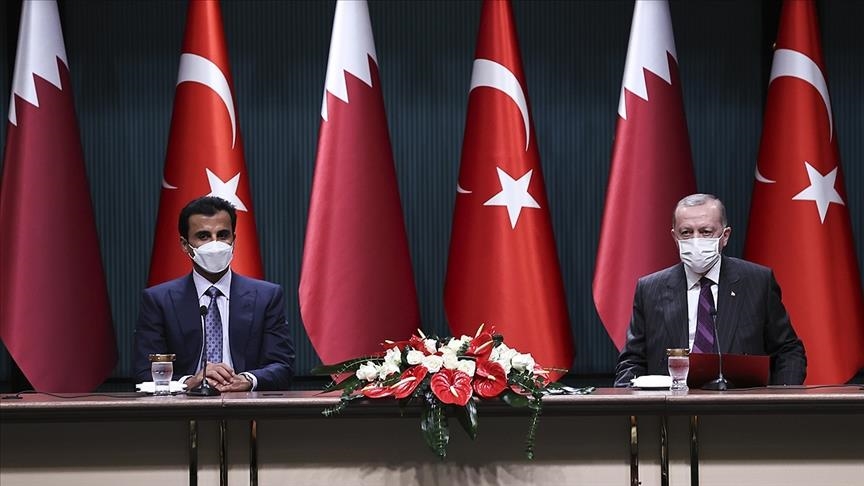
DOHA, Qatar
Since the rise of the Justice and Development (AK) Party to power in Turkey in 2002, relations between Turkey and Qatar have witnessed rapid development in various fields.
In a volatile region like the Middle East, the ability of the two countries to maintain strong relations and have a convergence of views on many regional and international matters represents a rare "distinguished experience" that has provided a strong basis for increased interdependence and cooperation between the two allies.
Turkish President Recep Tayyip Erdogan is set to pay a two-day official visit to the Qatari capital Doha on Monday to attend the 7th meeting of the Turkey-Qatar Supreme Strategic Committee.
His visit comes at the invitation of Qatari Emir Sheikh Tamim bin Hamad Al Thani, Turkey’s Communications Directorate said Sunday in a statement.
The two leaders are expected to review bilateral relations in all dimensions and discuss steps that can be taken to deepen bilateral cooperation, in addition to regional and international issues.
Big Boom
While relations between Turkey and Qatar officially began in 1979 with the opening of the two countries' embassies in Doha and Ankara, they witnessed a great boom following the AK Party's rise to power in 2002. In the same year, Erdogan, then the country’s prime minister, visited Qatar alongside a number of his cabinet members.
The two countries agreed to develop economic relations especially in the field of energy. Several other high-level visits followed, which have seen more deals reached in various fields.
In 2008, the first Turkish-Qatari Business Forum was held in Doha, in the presence of the then Turkish President Abdullah Gul. In the same year, the two countries signed a memorandum of understanding to start comprehensive cooperation between them in various fields.
In 2013, Erdogan inaugurated the new headquarters of the Turkish Embassy in Doha, and Qatar was the first Arab country visited by Erdogan after he assumed the presidency in 2014.

Joint Strategic Committee
In December 2014, President Erdogan and the Emir of Qatar, Tamim bin Hamad, signed an agreement to establish the Joint Strategic Committee between the two countries.
Doha hosted the first session of the Joint Strategic Committee and a milestone achievement was made as the two countries agreed to cement relations between their respective armies.
Other sessions followed with the two countries taking turns to host them. Over the years, the two countries have widened their horizon of cooperation to include health, technology, and scientific cooperation and intellectual property among others.
Of all the agreements signed since the establishment of the Joint Strategic Committee, defense and military cooperation has made the fastest progress with an agreement reached in December 2014 to station Turkish forces on Qatari soil. The Turkish parliament ratified the deal in March 2015.
The new headquarters of the Turkish-Qatari joint forces known as Khalid bin Al-Walid Base was opened in December 2019 in the presence of senior military leaders from the two countries.
Failed coup attempt
In the spirit of fraternal relations, Qatar was the first Arab country to condemn the failed coup attempt in Turkey in 2016.
Qatar’s support, which came even before the coup was foiled, was acknowledged by President Erdogan, who received a phone call from Sheikh Tamim on the night of the failed coup attempt.
Tamim expressed his condemnation of the coup attempt and reiterated his country’s support and solidarity with the Republic of Turkey.
In affirmation of Qatar’s support for Turkey, Qatari Foreign Minister Mohammed bin Abdulrahman Al Thani was the first foreign official to visit Ankara to reiterate his country's support for Turkey just two weeks after the failed coup attempt.
Breaking the siege
On June 5, 2017, Saudi Arabia, the United Arab Emirates (UAE), Bahrain, and Egypt abruptly severed diplomatic relations with Qatar and imposed a land, sea, and air blockade in hopes of making it comply with a long list of demands.
The four states accused Doha of "supporting terrorism," an allegation vociferously denied by Qatar, describing the Saudi-led embargo as a violation of international law.
But the Turkish response was decisive. Defense Minister Hulusi Akar immediately stated that Turkey would not close its base in Qatar.
On June 7, the Turkish parliament promptly approved legislation allowing the deployment of Turkish troops to Qatar.
Furthermore, Turkey made food shipments, water, and medicine to Qatar via air and sea freight. The Turkish government also promised to provide the necessary materials to build projects for the FIFA World Cup 2022.
In return of good faith, Qatar announced $15 billion in direct investments in the Turkish economy, following the sharp decline in the Turkish lira in August 2018.
*Writing by Ibrahim Mukhtar








